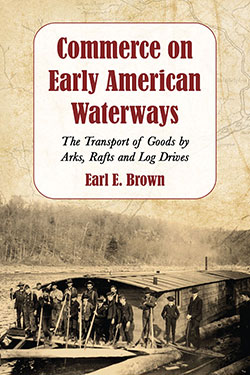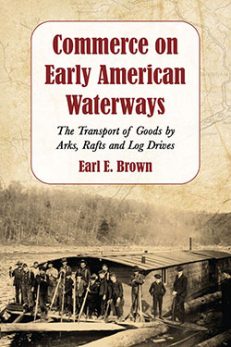Commerce on Early American Waterways
The Transport of Goods by Arks, Rafts and Log Drives
$39.95
In stock
About the Book
Colonial pioneers began entering the logging and forestry industries in great numbers along the Allegheny and Appalachian mountains during the late 1700s and were soon producing more products than they could use. This book details how settlers used waterways to transport goods to coastal markets. Topics include the timeline of water craft construction; major figures in the development of early waterway transportation; types of goods transported; and occupational hazards from raging rapids to snowstorms. The book also features photographs, charts, and diary excerpts and an appendix detailing ark and raft construction.
Twenty years of research produced one hundred and fifteen sources, ninety-five percent from historical societies, since large libraries held minimal information on the subject. For the Civil War buffs, chapters 5 through 9 give the “Woodhick’s” (Pennsylvania Lumberjack) work ethic that made them a feared fighting force in the Union Army, known as the Bucktails.
About the Author(s)
Bibliographic Details
Earl E. Brown
Format: softcover (6 x 9)
Pages: 240
Bibliographic Info: 36 photos, appendix, glossary, bibliography, index
Copyright Date: 2010
pISBN: 978-0-7864-4742-8
eISBN: 978-0-7864-5596-6
Imprint: McFarland
Table of Contents
Acknowledgments vi
Preface 1
Introduction: The Use of Rivers and Streams to Transport Heavy Loads to Market 3
1. Early Colonial America 7
The Beginning 7
Rafts, Durham Boats and Conestoga Wagons 7
Philadelphia 9
Baltimore and the Susquehanna Valley 9
The French and Indian War 9
The Quakers Lose Control of the Pennsylvania Assembly 10
Baltimore 11
Between the Wars 11
The Revolutionary War 1776–1783 12
Pennsylvania 12
Baltimore 13
After the Revolutionary War 13
Pennsylvania 13
Middletown, York Haven and Columbia 14
Baltimore 15
2. The Susquehanna Is Opened to the Chesapeake Bay Cryder’s Run 17
3. Arks on the Penns Creek 27
The Creek 27
Building a Dam Across a Public Highway 32
Three Sides to the Chute Controversy 33
Ark Navigation 34
Butter Rock 36
Ark Stoving (Wrecking) 37
Ark Cargos 37
The Costs to Get Products to Market 38
What Was 180,000 Bushels of Wheat Worth? 39
Warehouses, Landings and Ark Construction 39
Penns Valley Arks 40
The Manufacturing of Wheat 41
4. Waterways from 1791 to the Early 1800s 43
Arks and Rafts in New York State 43
Before the War of 1812 46
Vying for the Susquehanna River Trade 47
The Steamboat 48
Baltimore During the War of 1812 48
Arks on Other Public Highways 49
The West Branch of the Susquehanna River 49
The North Branch of the Susquehanna River 51
The Lehigh River 52
The Main Branch of the Susquehanna River 53
Baltimore after the War of 1812 53
The Canals 54
5. Rafting on the North Branch 57
Strong’s Journal 57
Strong’s Voyage 58
Thomas Yates’ Charts 79
6. Rafting on the Main Branches 84
The Shamokin Dam 84
Simon Girty 85
Lazy Man’s Gap 86
Lower River Pilots 92
Conewago Falls 92
Susquehanna Gorge 95
Port Deposit, Maryland 96
Jacob Tome’s Port Deposit 98
William Lowman: a Waterman’s Life in Port Deposit 98
Dancing over the Columbia Dam 100
7. Rafts on the West Branch 105
William Langdon: 1855 105
8. Tales of the West Branch 123
Getting Stuck on a Rock 123
Rafting Grub 124
Danger at Shamokin Dam 125
A Tragedy at Millers Landing 126
Caught in a Spring Snowstorm 127
A Rafting Town in Season 132
Cherry Tree Joe 134
Ladies on the River 140
My First Rafting Trip 145
Gallows Harbor: How it Got its Name 149
9. Log Driving 151
Log Drive to Williamsport in 1868 151
John Dubois and Hiram Woodward 152
The Woodhicks 153
The Raftsmen and Log Drivers’ Relationships 154
Log Rustlers 156
The Camps 157
Camp Dubois Opens 158
The Jobber 159
Felling and Skidding 159
Parties along the Sinnemahoning Creek 160
How the Number of Logs Was Estimated 161
How the Drive Was Organized 162
The Drive Begins 162
Tragedy on the River 166
On to Williamsport 166
West Branch Log Drives 169
10. Woodhicks 173
Jam Breakers 173
Woodhick Baseball 179
Bullies 182
Abe Bloom 182
Miles Dent 184
Ambrose Campbell and Len Childs 185
Big Bob Gowdy 185
11. The Mississippi Watershed 188
Early Road West 188
The Allegheny and Ohio Rivers 189
The Mississippi River 191
Appendix: Arks and Raft construction 193
Ark Construction 193
Board Raft Construction 195
Manufacturing Sticks 199
Manufacturing a Stick into a Spar 201
Manufacturing a Stick into a Square Timber 202
Building a Hauling or Skidding Road 203
Hauling or Skidding Spars 204
Landings or Rafting Grounds 206
Oars or Sweeps 206
Rafting-in a Spar Raft 207
Rafting-in a Square Timber Raft 210
Double Bowing 213
Landing and Snubbing Rafts 213
Rafting Shanties 214
Rafting-in a Round Log Raft 215
Log Slide Construction 215
Glossary 193
Works Cited 227
Index 233
Book Reviews & Awards
“valuable”—International Journal of Maritime History.





